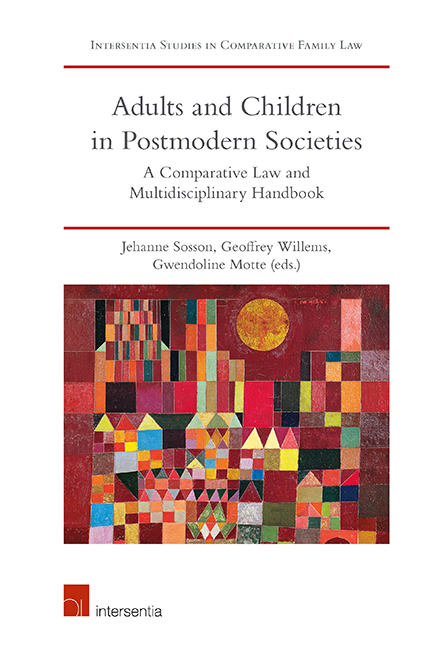Book contents
- Frontmatter
- Contents
- List of Cases
- List of Contributors
- Introduction
- PART I NATIONAL REPORTS ON LEGAL REGULATIONS OF RELATIONSHIPS BETWEEN ADULTS AND CHILDREN
- Questionnaire
- Models
- Algeria
- Argentina
- Australia
- Belgium
- Canada
- Democratic Republic of the Congo
- England and Wales
- France
- Germany
- Ireland
- Italy
- Japan
- The Netherlands
- Romania
- Spain and Catalonia
- Sweden
- Switzerland
- United States of America
- PART II INTERDISCIPLINARY APPROACH
- PART III INTERNATIONAL LAW INSIGHTS
- PART IV COMPARATIVE APPROACH
- General Conclusion: The Challenge of Transparent and Inclusive Parenthood/Parentality in a Pluralist and Cosmopolitan Context
- About the Editors
Australia
from PART I - NATIONAL REPORTS ON LEGAL REGULATIONS OF RELATIONSHIPS BETWEEN ADULTS AND CHILDREN
Published online by Cambridge University Press: 26 June 2019
- Frontmatter
- Contents
- List of Cases
- List of Contributors
- Introduction
- PART I NATIONAL REPORTS ON LEGAL REGULATIONS OF RELATIONSHIPS BETWEEN ADULTS AND CHILDREN
- Questionnaire
- Models
- Algeria
- Argentina
- Australia
- Belgium
- Canada
- Democratic Republic of the Congo
- England and Wales
- France
- Germany
- Ireland
- Italy
- Japan
- The Netherlands
- Romania
- Spain and Catalonia
- Sweden
- Switzerland
- United States of America
- PART II INTERDISCIPLINARY APPROACH
- PART III INTERNATIONAL LAW INSIGHTS
- PART IV COMPARATIVE APPROACH
- General Conclusion: The Challenge of Transparent and Inclusive Parenthood/Parentality in a Pluralist and Cosmopolitan Context
- About the Editors
Summary
Australia is a federation. The division of powers set out in the Australian Constitution between the federal government and the state and territory governments is such that the legal relationship between adults and children is partly governed by federal law and partly by state law. Broadly speaking, the federal government has exclusive power in relation to the formation of marriage (and de facto relationships), divorce, parenting disputes and all maintenance obligations, with states retaining all residual jurisdiction (e.g. care and protection matters, adoption, surrogacy, artificial reproduction etc.). Having said that, as this chapter shows, there are complex interactions at times between state and federal law.
CHANGES IN THE TRADITIONAL FAMILY
A. MOTHERS
1. Is maternity automatically established by the birth certificate?
Leaving aside artificial reproductive situations and adoption (which have their own rules and are discussed at Q. 17 and 32), a woman who gives birth to a child is the legal mother of the child in Australia. This is because parenthood is – legally – dependent solely on biology. Under s 69R of the Family Law Act 1975 (Cth) (FLA) a person named on the birth certificate is presumed to be the parent of the child, so in a sense maternity is legally proved by being named on the birth certificate, because being named as a parent on a birth certificate raises a legal presumption of parenthood. However, this is only a presumption, which means that a person seeking to disprove parenthood of a person on the register bears the legal onus of proof. Thus, the birth certificate is relevant from an evidentiary point of view, though of course is regularly provided as proof of parenthood. Each state has its own birth registration legislation.
The presumption of parenthood can be rebutted by showing through a DNA test that the woman is not biologically the mother.
If a woman's name is not on the register, she is still legally the mother if she is the biological mother, but she will need to prove it if questioned.
- Type
- Chapter
- Information
- Adults and Children in Postmodern SocietiesA Comparative Law and Multidisciplinary Handbook, pp. 75 - 110Publisher: IntersentiaPrint publication year: 2019



